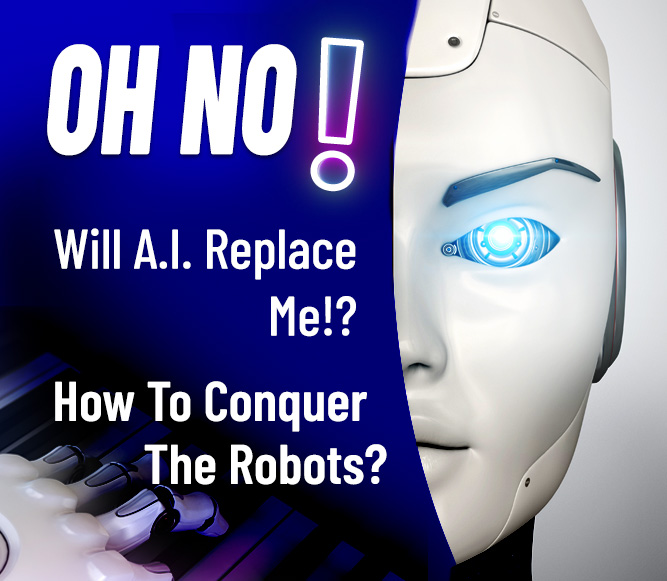Unless you have been living under a rock-- or off the grid--- you must have heard about the release of Open AI's artificial intelligence application entitled Chat GPT. This release was quickly followed by Microsoft Bing's AI chat bot and Google's soon-to-be-released AI app.
There has been a general outcry within the knowledge worker and creative community about how “generative AI” (meaning artificial intelligence that generates content) will impact various industries. In...
Show All...
Unless you have been living under a rock-- or off the grid--- you must have heard about the release of Open AI's artificial intelligence application entitled Chat GPT. This release was quickly followed by Microsoft Bing's AI chat bot and Google's soon-to-be-released AI app.
There has been a general outcry within the knowledge worker and creative community about how “generative AI” (meaning artificial intelligence that generates content) will impact various industries. In much the same way that Uber and Lift disrupted the transportation industries, Chat GPT and its competitors are disrupting our world in interesting ways. From passing the bar exam and getting an MBA, to publications like the Daily Mirror exploring Chat GPT as a way to write local news, generative AI is set to change the way we work, create, and live.
a brief history...
While it’s not exactly the same, this type of application has been slowly developing within the music industry over the past decade. One early entry was created in 2005 by two MIT Media Lab students. The Echo Nest was a music intelligence and data platform that collected detailed and sophisticated data about all the recorded music in the world. It collected specific data on listening habits and used it to predict what music users would enjoy the most.
Analytics and predictive models like The Echo Nest allow labels to make smarter decisions concerning their investments – decisions informed by a data-based comprehensive understanding of listener preferences. While not quite the same as generative AI, it is an early example of this type of technology's influence on music and the music business.
aI and music creation
Software companies are already adapting AI to create music. One of China's largest music streaming services Tencent Music Entertainment recently announced that they have released over 1000 tracks made using AI-generated vocals. In fact, one recently created track has reached over 100 million streams. Titled “Today," the song has become the first by an AI singer to surpass the 100 million stream threshold.
In the film and television industries, generative AI is already making inroads. Google MusicLM generates snippets of songs and minutes-long compositions based on text prompts. Film and TV companies can now use AI-created music by typing in a text prompt like suspenseful, or calming sound, potentially replacing human composers and curated song libraries.
One company, Ecrett Music, is an AI-driven music composing service focused on the film and TV industry. The composition process is straightforward. Select a type of film, or a mood, hit create and that's it. AI will compose a unique song based on your text prompts. You can drag and drop your video into the app to see if the music works. If you are not convinced, you can customize the composition's length, instruments, and structure until it syncs with your video.
so is it all hype or will the software companies win?
The fact is, we are in the very early stages of a revolution in artificial intelligence. It is already impacting the music industry in innovative ways and AI will continue to affect almost every area of our lives in the coming years and decades.
Quite a few artists have already moved away from the manual production process and are using AI. From composition apps and mastering platforms to song identification tools like SHAZAM, AI is already impacting the industry and changing how, where, and when music is created.
While the recent hype has raised the profile of AI in general, one of the first pop songs, Daddy's Car, was crafted by AI and debuted in 2016. In 2017, YouTuber Taryn Southern released the first LP by a solo artist composed and produced using AI titled I AM AI. Today, besides pop music, AI is increasingly used to create royalty-free music for TV, film, video, and the web. Artificial intelligence is even being used to compose symphonies!
Some forward-thinking artists are already training machine-learning models with data based on what they want their music to sound like. Other musicians are feeding algorithm-based systems, modeled after the human brain, with music based on bands or sounds that then create compositions, melodies, and rhythmic patterns.
Clearly, AI is here to stay. Artificial intelligence-powered tools are being applied in new and innovative ways to create new music. For musicians and composers, AI is ideally another tool to include in their arsenal. In much the same way that MIDI, digital synthesizers, samplers, and computer-based recording changed the industry, AI will be integrated into the creative process in innovative ways.
The adoption of AI, however, is not going to replace human musicians with computers. What it can become is an opportunity for content creators to explore paths they might otherwise never discover!
will the robots take over the music industry?
The short answer is not likely. As AI becomes more sophisticated and common, the way artists adopt it will evolve. With the growing demand for content from video games, to web videos, to film, content creators will need to deliver increasing volumes of music. The music industry will continue to undergo changes as AI proliferates, however, it will not replace a musician's ability to transmit sensory experiences to the listener. It will, however, become essential for serious musicians and all who participate in the industry to understand its potential and leverage it in their careers.
Show Less...